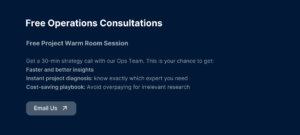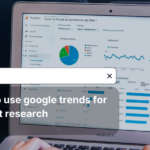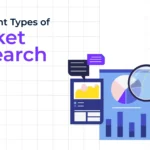When to Use In-Depth Interviews?
In-depth interviews should be used when you need a deep understanding of people’s motivations, experiences, beliefs, and emotions that cannot be captured through surveys or quantitative methods. They are particularly valuable when exploring complex topics, uncovering hidden insights, or developing a detailed understanding of user behavior.
The in-depth interview is one of the best methods to gather rich detail regarding customers’ behaviors, desires, and opinions. Unlike surveys or focus groups, in-depth interviews allow for a one-on-one interaction where respondents feel more comfortable giving their authentic feedback. But when should you decide to use this valuable form of research? This article describes the contexts in which in-depth interviews provide the most value and can help you and your organization make strategic decisions, understanding the customer.
What Are In-Depth Interviews?
In-depth interviews are conversations, guided by a trained moderator, that are either structured, semi-structured, or unstructured, and that go deeper into participant thinking. In an “interview,” it is typical to have only one participant and for the interviewer to ask open-ended questions. Interviews can be conducted face-to-face, via phone, or virtually.
When to Use In-Depth Interviews
-
When Exploring Complex Behaviors and Motivations
When you want to understand the “why” behind consumer behaviors, an in-depth interview is the best way to do that. Quantitative data can only reveal what is happening, but interviews tell you the reason for those patterns. These interviews offer a psychological and emotional dimension that goes beyond the numerical data.
Example: Understanding why users abandon a mobile app despite positive initial engagement.
-
When Research Topics Are Sensitive or Personal
For topics that require privacy or emotional sensitivity, participants will be more willing to speak candidly in a one-on-one and confidential setting rather than in a group.
Example: Research on health conditions, financial decision-making, or personal lifestyle choices.
-
When Target Participants Are Hard to Reach
Whether it is because of unique expertise or a demanding schedule, focus group participation is not a preferred method for executives and niche consumer segments. Concerns regarding confidentiality, time constraints, and the desire for more in-depth discussions make this method less appealing to individuals from this demographic. In-depth interviews can offer the perfect alternative, as they provide greater convenience, confidentiality, and a personalized research space in which participants can share their insights more freely and in greater depth.
Example: Interviewing medical professionals about a new governmental healthcare regulation.
-
During the Early Stages of Product or Concept Development
While designing a new product, in-depth interviews can help the researcher to refine concepts and reduce risk by obtaining early feedback, identifying possible barriers, and providing clarity on user needs before making a substantial investment.
Example: Prototype testing feature before launching a full product.
-
When You Need Detailed Customer Journeys
Conducting in-depth interviews also works very well for customer journey mapping, as they proceed in a question-by-question scheme of the decision-making process. This allows brands to help create opportunities to improve customer experience and maximize touchpoints.
Example: Exploring how a customer chooses a university program or insurance provider.
-
When Quantitative Data Needs Explanation
In-depth interviews may be used to explore and clarify results that were unexpected or unclear from surveys or statements analysing usage patterns. In-depth interviews, employed simultaneously with surveys or usage analysis, provide a more comprehensive understanding of the findings.
Example: Survey data suggests a decline in customer satisfaction. Interviews reveal the underlying
pain points.
-
When Studying Cultural or Social Influences
Cultural values and community norms have a significant influence on consumer behaviour. Utilizing in-depth interviews can help uncover those influences that shape branding and messaging approaches.
Example: Understanding how cultural beliefs impact food purchasing behaviours.
Benefits of Using In-Depth Interviews
- Rich, descriptive data
- Flexibility to explore emerging themes
- High participant engagement
- Opportunity to clarify responses in real time
- Confidential and trustworthy environment
Final Thoughts
In-depth interviews are particularly useful when you’re looking for insights that go beyond surface-level responses. This qualitative approach offers unparalleled depth and comprehensiveness, whether you’re designing new product ideas, uncovering genuine customer perspectives, or analysing difficult decision-making behaviours.
Nexus Expert Research specializes in providing high-quality, in-depth interviews to reveal transformational insights that lead to enlightened strategies and outcomes that matter.




